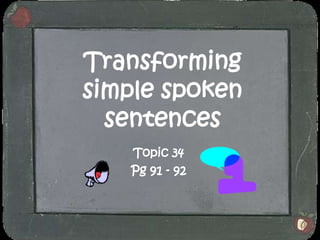
Transforming simple spoken sentences to reported speech
- 1. Transforming simple spoken sentences Topic 34 Pg 91 - 92
- 2. Converting Direct Speech to Reported Speech Some changes are necessary: 1) Changes in tenses 2) Changes in time/place 3) Changes in pronouns 4) Changes in word order
- 3. • Reporting direct speeches Changing tenses according to tenses of reporting verbs John says, “I am eight years old.” John says that he is eight years old.
- 4. My father said,” I have finished my work.” My father said that he had finished his work. Kandi told me,” I noticed you in the park.” Kandi told me that she had noticed me in the park.
- 5. Direct Reported am/is was are were has/have had do/does did went had gone was/were had been can could will would had had had must had to
- 6. 2. Not changing tenses when an action is still going on or when a universal fact is reported He said, “I am an interior decorator.” He said that he is an interior decorator. The teacher said, “Oxygen is produced during photosynthesis.” The teacher said that oxygen is produced during photosynthesis.
- 7. Transforming spoken sentences with time frame Topic 35 Pg 93 – 94
- 8. 3. Changing adverbs (when the main verb is in the past tense) Mrs Goh added, ”I will be leaving next week.” Mrs Goh added that she would be leaving the following week / the week after. Bobby said, “I shall be at the game tonight.” Bobby said that he would be at the game that night.
- 9. Direct Reported now then here there this that these those today that day tomorrow the next day/the following day/the day after yesterday the previous day/the day before last night the previous night/ the night before next week the following week ago before
- 10. 4. Changing pronouns (when the main verb is in the past tense) Joshua said, ”I will return the book myself.” Joshua said that he would return the book himself. She said, ”We can complete it on our own.” She said that they could complete it on their own.
- 11. Direct Reported I he/she me him/her my his/her mine his/hers we they our their ours theirs you I/me/him/her/he/she/ they/them your my/his/her/their yours mine/his/hers/theirs
- 13. Jim said, “I shall have plenty of work to do tomorrow.” Jim said that he would have plenty of work to do the following day / the next day. Mr Sim told the class, “The capital of Sweden is Stockholm.” Mr Sim told the class that the capital of Sweden is Stockholm.
- 14. “Could you take a photo of us with my camera?” the Japanese man asked me. The Japanese man asked me if / whether I could take a photo of them with his camera. The news report said, “Many places were flooded yesterday.” The news report said that many places were flooded the previous day / the day before.